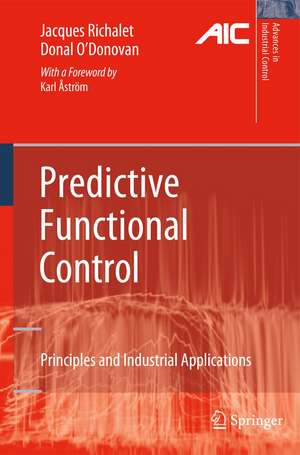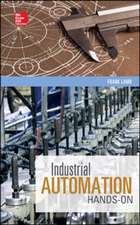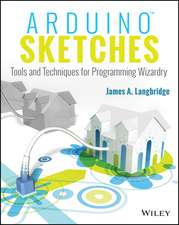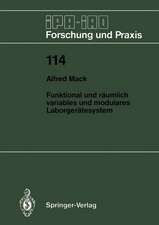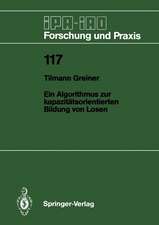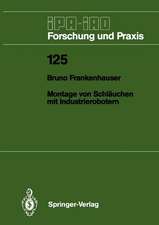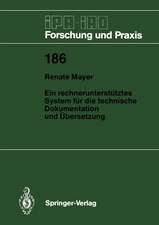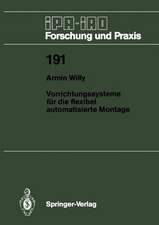Predictive Functional Control: Principles and Industrial Applications: Advances in Industrial Control
Autor Jacques Richalet Cuvânt înainte de Karl E. Åström Autor Donal O'Donovanen Limba Engleză Paperback – 2 ian 2013
| Toate formatele și edițiile | Preț | Express |
|---|---|---|
| Paperback (1) | 638.11 lei 6-8 săpt. | |
| SPRINGER LONDON – 2 ian 2013 | 638.11 lei 6-8 săpt. | |
| Hardback (1) | 644.95 lei 6-8 săpt. | |
| SPRINGER LONDON – 25 mai 2009 | 644.95 lei 6-8 săpt. |
Din seria Advances in Industrial Control
- 15%
 Preț: 643.34 lei
Preț: 643.34 lei - 23%
 Preț: 582.63 lei
Preț: 582.63 lei - 18%
 Preț: 783.98 lei
Preț: 783.98 lei - 18%
 Preț: 947.35 lei
Preț: 947.35 lei - 20%
 Preț: 568.24 lei
Preț: 568.24 lei - 15%
 Preț: 643.16 lei
Preț: 643.16 lei - 18%
 Preț: 899.21 lei
Preț: 899.21 lei - 18%
 Preț: 891.33 lei
Preț: 891.33 lei - 18%
 Preț: 740.57 lei
Preț: 740.57 lei - 18%
 Preț: 961.23 lei
Preț: 961.23 lei - 18%
 Preț: 955.08 lei
Preț: 955.08 lei - 15%
 Preț: 645.28 lei
Preț: 645.28 lei - 15%
 Preț: 638.43 lei
Preț: 638.43 lei - 18%
 Preț: 901.11 lei
Preț: 901.11 lei - 18%
 Preț: 1410.94 lei
Preț: 1410.94 lei - 18%
 Preț: 728.91 lei
Preț: 728.91 lei - 20%
 Preț: 1003.78 lei
Preț: 1003.78 lei - 18%
 Preț: 947.35 lei
Preț: 947.35 lei - 15%
 Preț: 643.34 lei
Preț: 643.34 lei - 15%
 Preț: 654.30 lei
Preț: 654.30 lei - 18%
 Preț: 950.52 lei
Preț: 950.52 lei - 15%
 Preț: 644.30 lei
Preț: 644.30 lei - 18%
 Preț: 1393.09 lei
Preț: 1393.09 lei - 18%
 Preț: 950.21 lei
Preț: 950.21 lei - 18%
 Preț: 949.90 lei
Preț: 949.90 lei - 18%
 Preț: 949.42 lei
Preț: 949.42 lei - 18%
 Preț: 950.52 lei
Preț: 950.52 lei - 18%
 Preț: 1113.71 lei
Preț: 1113.71 lei - 15%
 Preț: 650.04 lei
Preț: 650.04 lei - 15%
 Preț: 644.95 lei
Preț: 644.95 lei - 18%
 Preț: 950.33 lei
Preț: 950.33 lei - 18%
 Preț: 948.61 lei
Preț: 948.61 lei - 18%
 Preț: 1112.60 lei
Preț: 1112.60 lei - 15%
 Preț: 644.63 lei
Preț: 644.63 lei - 18%
 Preț: 953.20 lei
Preț: 953.20 lei - 18%
 Preț: 945.62 lei
Preț: 945.62 lei - 15%
 Preț: 640.88 lei
Preț: 640.88 lei - 15%
 Preț: 640.88 lei
Preț: 640.88 lei - 20%
 Preț: 650.92 lei
Preț: 650.92 lei - 18%
 Preț: 1112.60 lei
Preț: 1112.60 lei - 20%
 Preț: 998.36 lei
Preț: 998.36 lei - 15%
 Preț: 643.34 lei
Preț: 643.34 lei - 18%
 Preț: 948.92 lei
Preț: 948.92 lei - 18%
 Preț: 1381.43 lei
Preț: 1381.43 lei - 15%
 Preț: 651.51 lei
Preț: 651.51 lei - 15%
 Preț: 647.08 lei
Preț: 647.08 lei - 20%
 Preț: 563.66 lei
Preț: 563.66 lei - 18%
 Preț: 992.64 lei
Preț: 992.64 lei - 18%
 Preț: 1225.79 lei
Preț: 1225.79 lei
Preț: 638.11 lei
Preț vechi: 750.72 lei
-15% Nou
Puncte Express: 957
Preț estimativ în valută:
122.12€ • 127.02$ • 100.82£
122.12€ • 127.02$ • 100.82£
Carte tipărită la comandă
Livrare economică 14-28 aprilie
Preluare comenzi: 021 569.72.76
Specificații
ISBN-13: 9781849968454
ISBN-10: 1849968454
Pagini: 248
Ilustrații: XXII, 224 p.
Dimensiuni: 155 x 235 x 17 mm
Greutate: 0.35 kg
Ediția:2009
Editura: SPRINGER LONDON
Colecția Springer
Seria Advances in Industrial Control
Locul publicării:London, United Kingdom
ISBN-10: 1849968454
Pagini: 248
Ilustrații: XXII, 224 p.
Dimensiuni: 155 x 235 x 17 mm
Greutate: 0.35 kg
Ediția:2009
Editura: SPRINGER LONDON
Colecția Springer
Seria Advances in Industrial Control
Locul publicării:London, United Kingdom
Public țintă
ResearchCuprins
Why Predictive Control?.- Internal Model.- Reference Trajectory.- Control Computation.- Tuning.- Constraints.- Industrial Implementation.- Parametric Control.- Unstable Poles and Zeros.- Industrial Examples.- Conclusions.
Notă biografică
Jaques Richalet was born in Versailles, France, in 1936.
He studied aeronautical engineering at ENSAE in Paris and graduated in 1960. He then went to Berkeley, USA, where he obtained his MSc degree under the guidance of Prof. Zadeh. Back in Paris he worked in the field of applied mathematics and received his PhD in 1965.
His interest in model-based predictive control started as early as 1968. In the same year he founded the process engineering consulting company ADERSA with a major breakthrough being the first commissioned application of model based predictive control to a binary distillation column in 1973.
Since then he has been active in the areas of process identification, modelling and diagnosis methods such as predictive maintenance. Applications range from petrochemical and food industry to faster systems as encountered in the automotive and defense sector.
He was a manager of ADERSA till 2001 and is still working as a consultant for modelling and predictive control. He now lives in Versailles in France.
In his academic career he published more than fifty articles as well as three books on identification and predictive control. He has been president of the National Committee of Automatic Control and chairman of EEC Interest Group "CIDIC". For his achievements he was awarded the status as Chevalier de l'Ordre National du Merite and many researchers would probably agree to his being called "the grandfather of predictive control". He received the Nordic Process Control Award in 2007. He is now retired.
He studied aeronautical engineering at ENSAE in Paris and graduated in 1960. He then went to Berkeley, USA, where he obtained his MSc degree under the guidance of Prof. Zadeh. Back in Paris he worked in the field of applied mathematics and received his PhD in 1965.
His interest in model-based predictive control started as early as 1968. In the same year he founded the process engineering consulting company ADERSA with a major breakthrough being the first commissioned application of model based predictive control to a binary distillation column in 1973.
Since then he has been active in the areas of process identification, modelling and diagnosis methods such as predictive maintenance. Applications range from petrochemical and food industry to faster systems as encountered in the automotive and defense sector.
He was a manager of ADERSA till 2001 and is still working as a consultant for modelling and predictive control. He now lives in Versailles in France.
In his academic career he published more than fifty articles as well as three books on identification and predictive control. He has been president of the National Committee of Automatic Control and chairman of EEC Interest Group "CIDIC". For his achievements he was awarded the status as Chevalier de l'Ordre National du Merite and many researchers would probably agree to his being called "the grandfather of predictive control". He received the Nordic Process Control Award in 2007. He is now retired.
Textul de pe ultima copertă
The demands of the modern economic climate have led to a dramatic increase in the industrial application of model-based predictive control techniques. In fact, apart from PID, predictive control is probably the most popular control approach in use today.
The predictive functional control (PFC) technique was first used to develop a model-based predictive controller that was easy to understand, implement and tune from an instrumentation engineer’s perspective. In the forty years since, there have been thousands of successful applications of PFC controllers in a large and diverse group of industries.
Predictive Functional Control provides the reader with:
• a fundamental understanding of the principles associated with PFC;
• the basic PFC control equations to be implemented in all programmable logic controllers or digital control systems in block programming form; and
• tuning rules and implementation procedures.
In addition, some new features arising from the needs of the process industries are reported along with many examples of industrial applications.
This book is intended for technical staff in the process industries, familiar with classical control techniques, who need to take up the challenges posed by today’s economic environment; engineering graduate students requiring a background in modern control techniques; and industrial managers who require an overview of the PFC technique with a view to assessing its suitability for use in future projects.
The predictive functional control (PFC) technique was first used to develop a model-based predictive controller that was easy to understand, implement and tune from an instrumentation engineer’s perspective. In the forty years since, there have been thousands of successful applications of PFC controllers in a large and diverse group of industries.
Predictive Functional Control provides the reader with:
• a fundamental understanding of the principles associated with PFC;
• the basic PFC control equations to be implemented in all programmable logic controllers or digital control systems in block programming form; and
• tuning rules and implementation procedures.
In addition, some new features arising from the needs of the process industries are reported along with many examples of industrial applications.
This book is intended for technical staff in the process industries, familiar with classical control techniques, who need to take up the challenges posed by today’s economic environment; engineering graduate students requiring a background in modern control techniques; and industrial managers who require an overview of the PFC technique with a view to assessing its suitability for use in future projects.
Caracteristici
Introduces the industrial engineer to more efficient control for more cost-effective processes and more profitable industry Shows the reader how to implement predictive control in programmable logic and digital control systems Draws on the forty years of applications experience of the "Grandfather of predictive control" Includes supplementary material: sn.pub/extras
